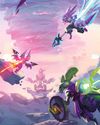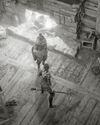
Misdirection is hardly an alien concept to games. We pay for the artifice, after all, knowing that the worlds we enter are built to immerse us in their scenarios and stakes, obscuring the machinic calculations that make them tick. Card Shark, though, holds misdirection unusually close to its heart. Its characters are impostors and liars, its visuals draw attention to their unreality, and its card tricks lay bare their component parts before your eyes. With that insight comes one of gaming’s oldest and greatest superpowers: the ability to cheat.
This story is from the {{IssueName}} edition of {{MagazineName}}.
Start your 7-day Magzter GOLD free trial to access thousands of curated premium stories, and 9,000+ magazines and newspapers.
Already a subscriber ? Sign In
This story is from the {{IssueName}} edition of {{MagazineName}}.
Start your 7-day Magzter GOLD free trial to access thousands of curated premium stories, and 9,000+ magazines and newspapers.
Already a subscriber? Sign In

NO MORE ROOM IN HELL 2
You're not alone in the dark

WINDBLOWN
Life after Dead Cells

COLLECTED WORKS - JOSH SAWYER
Journeying to the Forgotten Realms, Infinity and beyond with the RPG veteran

SCREENBOUND
Going deep in a mind-bending hybrid of perspectives

Trigger Happy
Shoot first, ask questions later

Grand strategist
Paradox's Mattias Lilja addresses the publisher's recent difficulties - and the plan to right the ship

Diablo IV
A progress report on the games we just can't quit

Ghosts 'n Goblins Resurrection
In Capcom's diabolical tribute, evil goes far deeper than the demons on the screen

SERENITY FORGE
How a near-death experience lit a fire in the Colorado-based developer and publisher

THE MAKING OF...ALIEN: ISOLATION
How a strategy-led studio built a survival horror masterpiece in Ridley Scott's image